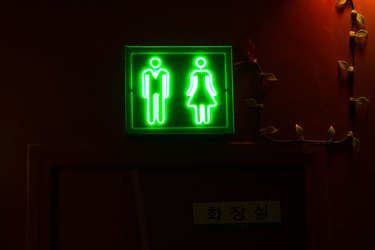
If you have loose, watery stools more than three times a day, you have diarrhea, as defined by MedlinePlus, a service of the U.S. National Library of Medicine and National Institutes of Health. Treatment of diarrhea varies and depends on the cause. You can alleviate some of your symptoms, and help prevent dehydration, with natural remedies for diarrhea like altering your diet.
Low-Fiber Foods
Video of the Day
Fibrous foods may irritate your bowel and aggravate diarrhea. The Academy of Nutrition and Dietetics advises grain products with less than 2 grams of fiber per serving. Choose bread, bagels, crackers and pasta made from white flour. Cook vegetables thoroughly and eat no-sugar-added canned varieties of fruits for smoother digestion.
Video of the Day
Low-Fat Foods
High-fat, greasy food can make diarrhea worse. Limit fats like oil, butter, cream and mayonnaise, to 8 teaspoons daily. Avoid nuts and nut butters, hot dogs, sausage, bacon, and fried chicken or fish while you have diarrhea. Choose low-fat or nonfat yogurt, plain breads and crackers, and well-cooked protein foods without added fat.
Probiotics
If you are lactose intolerant, limit milk products as they can exacerbate your diarrhea. Otherwise, enjoy foods with probiotics, which are beneficial bacteria that can shorten the duration and lessen the symptoms of diarrhea. Choose yogurt or kefir with live active cultures, or take a supplement.
Beverages
You may need to drink more fluids to stay hydrated during bouts of diarrhea. The Academy of Nutrition and Dietetics recommends drinking at least eight to 10 8-ounce cups of caffeine-free, alcohol-free liquid, such as broth, fruit juice and water, daily. Limit beverages sweetened with high-fructose corn syrup or sorbitol. Drink electrolyte solutions to replace important nutrients lost with diarrhea, such as potassium and sodium.
Consume a variety of foods to provide adequate nutrition during mild diarrhea. Choose a low-fiber cereal with soy milk and half a banana for breakfast. Consume a light snack of decaffeinated tea and graham crackers. For lunch, eat chicken and rice soup with cooked carrots, white toast with thinly-spread jelly and applesauce. Another snack could consist of crackers and fruit juice. Have a light dinner of baked chicken, mashed potatoes without skin and cooked green beans. For an evening snack, enjoy a cup of flavored yogurt. Throughout the day, consume allowed beverages to maintain hydration.
Is this an emergency? If you are experiencing serious medical symptoms, please see the National Library of Medicine’s list of signs you need emergency medical attention or call 911.